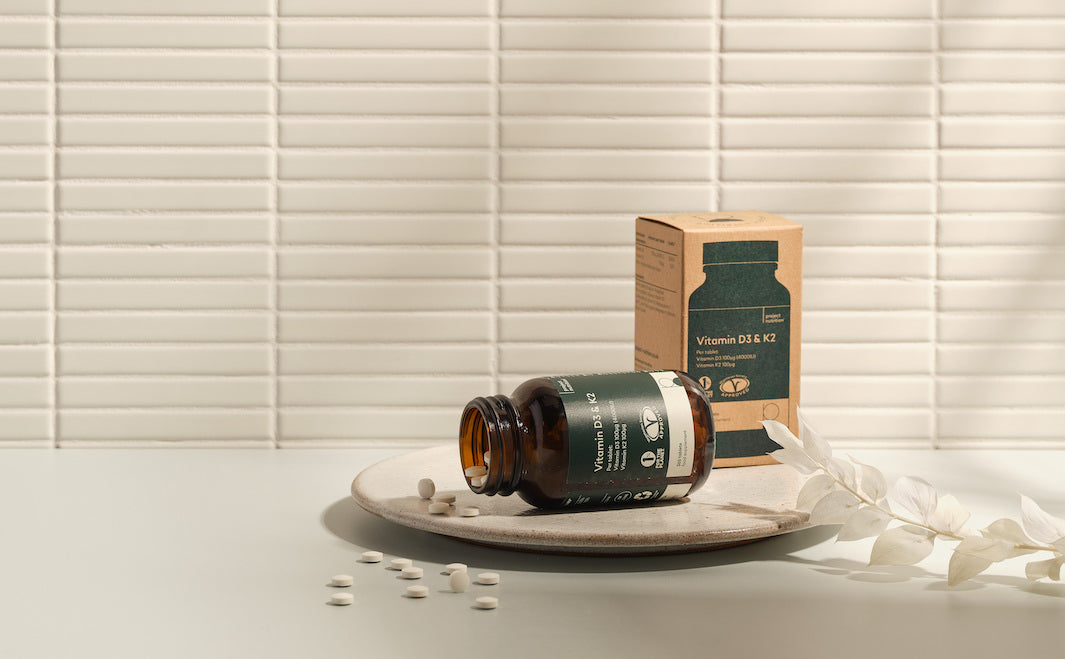The benefits of taking vitamins D3 and K2 together

Vitamin D plays an essential role in keeping our bones healthy. But research shows that combining it with vitamin K could give your bones an even bigger boost – and some extra health benefits too.
Keeping our bones healthy is a lifelong pursuit. Although genetics play a part in the strength of your bones, lifestyle and diet have a big impact too – and that includes getting your daily dose of vitamin D.
Why do we need vitamin D?
The UK government recommends we all take 10 micrograms (μg) of vitamin D each day. That’s because it plays a fundamental role not just in our bone health, but for other aspects of our health, like our immunity.
It’s difficult to get the recommended intake of vitamin D from food alone. In fact, the majority of vitamin D we need is actually made through our skin, so keeping topped up in a cloudy country like the UK is difficult[1]. A vitamin D deficiency can lead to osteomalacia, a condition where the bones don’t maintain their calcium levels and become weaker. Symptoms of a vitamin D deficiency can include fatigue, bone pain, muscle weakness, aches and cramps, and mood changes like depression.
But before committing to a vitamin D supplement, it’s worth considering how you can make your vitamin D work harder by combining it with a form of vitamin K to boost the benefits for your bones and heart.
The different types of vitamin D and vitamin K
First, there are two forms of each vitamin to consider. For vitamin D, there’s vitamin D2 and vitamin D3. “Both are absorbed well in the gut but vitamin D3 is more easily absorbed and lasts longer in your body,” says Sophie Medlin, Director and Specialist Dietitian at City Dietitians.
The two naturally occurring forms of vitamin K are vitamin K1 (phylloquinone) and vitamin K2 (menaquinone or MKs/MK-n). It’s the MK-7 form of vitamin K2 that’s absorbed better and lasts for longer in the body compared to vitamin K1[2].
Why should I take vitamin D3 and vitamin K2 together?
The way vitamin D3 and vitamin K2 interact offers new potential for how we look after our bone and heart health. Research has found the combination of the two vitamins can increase bone quality, be useful as a treatment for osteoporosis and help prevent fractures[3], while vitamin K2 could be beneficial in treating other diseases like diabetes, heart disease, cancer and osteoarthritis[4].
Vitamin D is particularly crucial for bone health because it works with calcium, an essential mineral for bones[5]. “Vitamin D promotes calcium absorption in the gut, allowing our bones to be mineralised properly,” says Sophie. But pair it with vitamin K2, and the health effects become greater.
“Vitamin D3 and vitamin K2 ensure that calcium is absorbed easily and reaches the bone mass while preventing arterial calcification [a build-up of calcium in your arteries]. Essentially, vitamin K2 works together with vitamin D to ensure calcium is deposited where it needs to be in the body.”
She adds: “Vitamin D promotes the production of proteins, which require vitamin K in order to function properly. Current evidence supports the notion that joint supplementation of vitamins D and K might be more effective than the consumption of either alone for bone and cardiovascular health. This is because vitamin K can help to get calcium into bones without causing calcification of other tissues.”
When should I take vitamin D3 and vitamin K2?
If you want to boost your bone health and reap some of the additional health benefits vitamin K2 has to offer, you could consider adding it to your daily government-recommended vitamin D supplementation.
Sophie also suggests that supplementation might be particularly useful for some groups. “Certain health conditions may make you more at risk of a vitamin D3 or vitamin K2 deficiency. People who have early indications of cardiovascular disease or osteoporosis can also take a higher dose to optimise their outcomes.” Sophie recommends speaking to your doctor or a dietitian before taking any supplements.
[1] https://www.bda.uk.com/resource/vitamin-d.html
[2] http://ncbi.nlm.nih.gov/pmc/articles/PMC7230802/
[3] https://pubmed.ncbi.nlm.nih.gov/32972636/



